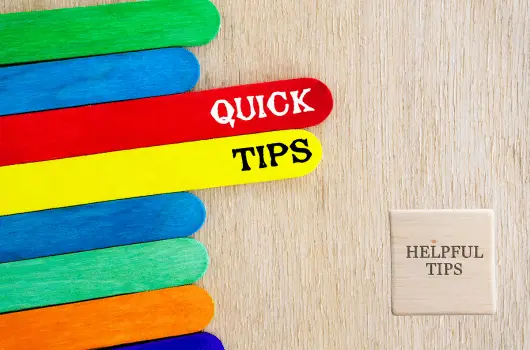
Teaching Interview Tips for Your Dream Job
Imagine you're sitting in a chair and looking at your interviewer. Your palms are sweating, and your heart is racing. You are about to start one of the most important conversations of your career. Hold on a second; it is not how it should be.
If you are here it means you are about to have your teacher interview. And most likely nervous about it.
Do not be afraid, relax. With the right preparation and mindset, you can shine during your interview.
Let’s explore the world of teaching interviews inside out. And learn the strategies that may help you land your dream job.
Understanding the Teaching Interview
Before we go through the specific tips, let’s understand the nature of teaching interviews. Teaching interviews can be online and offline.
And they often involve multiple stages and various stakeholders. What stages you might face:
• Stage 1: Initial screening interviews (often via phone or video call)
• Stage 2: Online or In-person interviews with administrators
• Stage 3: Panel interviews with teachers, parents, or community members
• Stage 4: Teaching demonstrations or sample lessons
The stages may differ depending on the school or the nature of your position online or on-site. And each of them requires a slightly different approach.
However, the core principles remain the same. You show your passion for teaching and expertise in your subject area. As well as your ability to connect with students.
Pre-Interview Preparation

The first stage, even before your interview, is preparation. You applied to the positions and were invited for the interview.
Now you have to know all the information to pass it successfully.
Research, research, research
To begin with, you wouldn't walk into a classroom unprepared. The same goes for your interview. Do not walk in unprepared either.
Thoroughly research the school or district and the position itself. Look into:
• Names of your interviewers. In case it is a video interview it will be written on the screen. However, it is a good idea to know them in advance.
• School's mission statement and core values.
• What were their recent initiatives or programs?
• Any challenges the school or district is facing.
• Any details of the position description and requirements.
Usually, this information will help you prepare and adjust your responses. Your task will be to show that you're genuinely interested in working with them. And you are the right candidate for the job.
Review your teaching philosophy
Usually, your teaching philosophy is the foundation of your practice.
However, it may happen, that you did not have any teaching experience beforehand. No problem, do not panic, relax.
Before the interview, take some time to think and do some research on the following:
• What are your beliefs about how students learn best?
• What is your approach to classroom management?
• How do you incorporate diversity and inclusion when teaching?
• And, what are your strategies for engaging students and making learning fun?
These questions will greatly help you prepare and be ready to answer many unexpected questions.
Prepare Concrete Examples
Interviewers when asking questions, love to know specific examples. One of the best techniques to structure your answer is the STAR model. This model stands for Situation, Task, Action, and Results.
• In the Situation, you describe what situation you were involved in. Add some context and background.
• Then you talk about the Task or specific challenge in that situation for you.
• Afterward, you talk about what specific Actions you took to address that challenge.
• And the outcomes or Results of your actions? You may also highlight what you achieved or learned.
Instead of speaking in generalities, prepare the answers that follow this model. You may also add some proper anecdotes that illustrate your teaching skills. Underline your problem-solving abilities, and impact on students.
Especially think about times when you:
• Successfully differentiated instruction to meet the needs of diverse learners.
• Collaborated effectively with colleagues or parents.
• Handled a challenging situation.
• Also, how did you implement technology in an innovative way.
These stories told in the STAR model will make your answers more engaging and memorable.
Predict Common Questions
It is very challenging to predict every question. Since the interview is more of a conversation.
And it is a time when a potential employer assesses who you are as a person, and what is your experience. Also, what is your genuine interest in working for them and whether you fit their mission?
And you, on the other hand, assess them too.
However, there are some common questions you will likely hear:
• Why did you become a teacher?
• How do you manage the classroom or handle classroom discipline?
• How do you differentiate instruction for diverse learners?
• How do you blend technology into your lessons?
• How do you communicate with students or parents?
• How do you handle stress?
I advise you to practice your responses. However, avoid memorizing them. It will be very visible if you memorize something. You will sound like a robot. And it will not play well in the interview.
People prefer genuine answers. Plus, your prepared question may not match the question of the interviewer. In this case, you will quickly get lost in your memorized answer and sound off-topic.
Prepare your questions
As I mentioned, an interview is a dialog, not an interrogation. And you evaluate the company you want to work for as well.
Hence, prepare your questions. It will demonstrate your interest in the position and the school.
Here are some examples of questions:
• What professional development opportunities do you offer for teachers?
• How does the school support new teachers?
• Why did the previous teacher leave the position?
• How does the school involve parents and the community in education?
• What steps does the interview process consist of?
• What is their timeframe for response about the next stage?
You are welcome to come up with your own general and position-specific questions. And if you have several questions, do not be shy to ask all of them.
Strategies for Successful Interview

The next stage is the interview itself. You have done your thorough preparation for it, so you should be less nervous.
Make a strong first impression
They say you never get a second chance to make a first impression. And the interviews are not an exception.
Here's how you can start strong:
• First of all, dress appropriately. No one would require you to appear in a suit but choose professional attire. Make sure you also feel confident and comfortable in it.
• Also, join the call or arrive a couple of minutes early. In this case, you will make sure, you don’t face any unexpected tech issues. Or that you have found the right place.
• Have additional copies of your CV, teaching certificate, and any other relevant documents. If it is online have them opened or ready to share.
• Be friendly and do not be shy to greet people first and ask them how are they doing. It will give a positive impression of you and show you are relaxed.
Show your passion
In my sincere opinion, several professions are more than a job, they are a calling. And teaching is one of them.
So, show your passion for it through your responses, body language, and tone. Share what excites you about teaching. Why did you choose this career, and how do you strive to make a difference?
Highlight your adaptability
Nowadays, adaptability is key. Teaching is one of the most demanding jobs for this skill.
You will need to demonstrate that you can adapt to different situations. That you know how to handle unexpected challenges in the classroom.
Also, you will be able to embrace curriculum changes on the go. As well as adapt to new educational standards.
Demonstrate your collaboration skills
Schools are looking for team players. Highlight that you can work well with others. Share examples of successful collaborations.
If you do not have teaching experience, share examples from projects at the university. Maybe you were tutoring when you were a student. Or even examples from your internships.
Maybe you participated in university initiatives or committees. I am sure you can find many examples to show it.
Address your weaknesses
To begin with, none of us is perfect. And we do not want to pretend we are. Some of the interviewers even ask directly what are your weaknesses. So, be ready to answer them honestly.
Also, if you have any potential red flags, like gaps in employment, or limited experience, address them. Focus on what you have learned and how you have grown from them.
Be mindful of your body language
Do you know that our communication consists of 55% of body language, 38% of voice and tone, and only 7% of words?
That is why it is so important to mind your body language. Imagine someone sitting with their arms crossed and looking in a different direction. Imagined?
What impression does he give? For sure not as an engaged, positive, and interested person.
During your interview, remember to:
• Maintain good eye contact.
• Sit up straight and lean slightly forward. It will show engagement.
• Smile genuinely and naturally, do not force it. Also do not smile all the time, only when appropriate.
• Also, avoid nervous habits like playing with your hair or biting with your foot.
Listen Actively
It is well known that good teachers are good listeners. Show off this skill during your interview. Also, pay close attention to the questions.
Ask for clarification if you need it. Also, you can confirm your understanding of the question.
And do not forget to reference parts of the question in your answer. It will show you were listening.
Navigating Tricky Interview Situations

Sometimes it may happen that even with thorough preparation, some challenges will come up.
Let’s consider the most common ones and ideas on how to handle them.
You do not know the answer to a question
First of all, don’t panic. It is normal not to have all the answers. In case the interviewer asks you something you are not familiar with, be honest.
You may answer like: "This is an interesting question. While I don't have direct experience with that, here's how I would approach learning about it...".
With this, you will show that even if you do not know something, you are ready to learn. And you are open to improvements.
You are asked an illegal question
While it happens very rarely, you can still face a question that is not legally proper to ask or may sound like discrimination.
First of all, you are not obliged to answer it. You may politely redirect the conversation back to your qualifications for the job.
Or point out that it is not the kind of question you would expect.
After the Interview

After the interview, your job is not done. There are specific things you can do to stand out.
First of all, within 24 hours after it, it is a good tone to send a thank you email to the interviewers.
Also, it may happen that you do not hear back from the company within the timeframe they provided. It may happen, but it does not mean they decided not to proceed with you.
Hence, it is ok to follow up with a polite email or a phone call expressing your continued interest in the position.
Finally, whether you get the job or not, each interview is your learning opportunity. Therefore, reflect on it what went well and what could be improved next time and keep going.
Special Tips for Different Types of Interviews

As I mentioned in the beginning there are different stages of the interviews. While the tips of this article are general for each stage, there are some specific ones.
Let’s consider them:
Phone or video interviews
• Make sure you have a quiet space with a good light and reliable internet connection.
• Have your CV and notes opened in front of you. But do not put a lot of papers next to you, and start rustling them. Your interviewers will hear all that.
• And, look directly at the camera during the video interviews. It will simulate eye contact.
Panel interviews
• Make eye contact with all panel members, not just the person asking the question. If it is a video interview, it is also pretty much possible to do the same.
People can very much see where your eyes point.
• If you are not sure who to address first, start with the person who asked the question. And while you continue answering make eye contact with others.
Teaching demonstrations
• If possible, familiarize yourself with the classroom before the interview. You may want to know the space and available resources.
In the case of a video conference, learn a bit about the online tool and its possibilities.
For example, Google Meet and Zoom provide you with a virtual whiteboard. Zoom in specific also provides you with different rooms to divide students.
• Also, prepare more materials than you may need. This is in case you finish early. It will show your planning skills and flexibility.
• And engage the observers as if they were students to demonstrate your classroom presence.
• Also, make sure you engage “students” that do not participate or participate less. This is one of the favorite tricks of the interviewers.
• And finally, mind how much time you spend talking. Usually, your instructions should not exceed 30% of all teaching classroom time.
Remember, a teaching interview is an opportunity to show your passion, skills, and unique qualities. Also, it is your chance to demonstrate why you are the perfect person for the role and the school.
If you put effort into preparing, present yourself professionally, and let yourself be yourself you will shine.
And even if you do not get this particular job, there are plenty more. However, each interview will help you master your skills and get closer to your right fit.
So, take a deep breath, believe in yourself, and go show them how amazing a teacher you are!

Written by Liudmyla M.
Experienced Tutor with over 12 years of teaching both online and offline. Passionate about helping students achieve their goals through personalized and practical methods.

